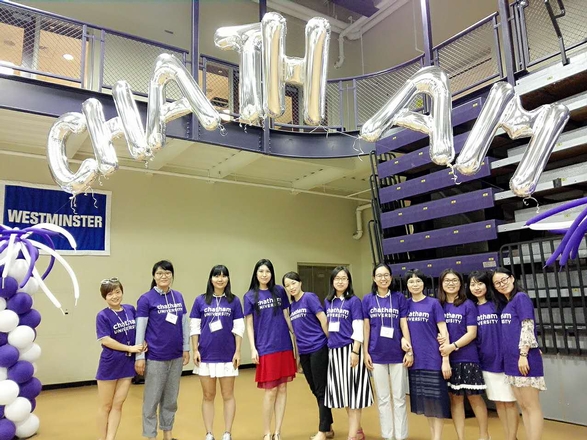By Debra Wolf, Associate Professor of Nursing, Assistant Director of Nursing Programs, Healthcare Informatics Coordinator

The success of any educational program begins with the visionary leader who plants the seed of exploring new opportunities and continues with dedicated faculty and staff who nurture the seed until life appears. The International Master in Nursing Program offered by the Nursing Department within the School of Health Sciences (SHS) at Chatham University has been very successful thanks to the vision and leadership of several individuals and departments at Chatham University. Visionary leaders such as Dr. Barazzone and Dr. Wenying Xu from administration who supported the idea from conception to implementation. Leaders such as Dr. Hunker and Dr. Spadaro from the nursing department who have been working endlessly to make the vision a reality. Finally, leadership from the Office of International Affairs, whose knowledge and experience in foreign affairs and English language instruction, has been instrumental in helping the students arrive safely and housed appropriately and receive the English support that they need during their advanced scientific study at Chatham.
In Fall of 2016, the nursing department admitted its third cohort of Chinese nurses from Shanghai into the Master of Science in Nursing Program. To date the department has successfully graduated 29 students from the program in the span of 2 years.
Collaborative interprofessional team work has been a critical aspect of the international program. The faculty and staff within the nursing program continue to support the program on a regular basis. For example, faculty frequently guest lecture in the classroom, offering content focused on their scholarly work and expertise. Faculty meet 1:1 with students to further support them on an individual basis, offering detailed support if students’ interest is closely related to the faculty’s scholarly agenda. Faculty and staff have taken time out of their day to accompany the international nurses to campus events (during day, night and weekends), introducing them to our culture and celebrations.
Nursing faculty and staff collectively go out of their way to make the students feel comfortable and welcomed in America, for this is the first time most of the nurses have been to the United States. For example, one staff member’s son made personalized welcome signs illustrating the American and Chinese flags for each nurse. Another created poster boards illustrating their names and photos to welcome the students. Another faculty invited the entire cohort to spend the night at their camp and provided tents, sleeping bags and all the other necessities. Finally, the department sponsors a welcome and Chinese New Year reception for the students inviting other departments within the SHS.
As the program continues to grow so does the support from Chatham University, not only from faculty and staff, but also from our graduate students. Most recently a call for graduate students in the SHS to be part of a Peer Partnering Program, a program to match a Chinese nurse with a graduate student in the SHS for socialization, was initiated with great response and success. Chinese nurses in past cohorts shared their need to socialize more with other American students to better understand our culture. The peers meet independently on a weekly to biweekly basis or as time permits to explore each other’s culture. Seeds were planted and friendships are growing!
As the program continues to grow, the department is preparing for Cohort #4 in fall 2017, which will require additional revisions and changes. Although change is not easy, having dedicated individuals who are open to new ideas and willing to assist and go the extra mile is what has and will continue to make this program a success. As they say, it takes a village to raise a child. It takes a University to graduate an international student. Thanks to all the individuals and departments (not mentioned above) who have been a part of this program’s success. We could not have done it without you.
